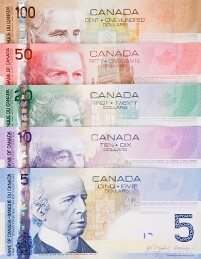The Canadian dollar weakened to a four-week low on Tuesday ahead of the Bank of Canada (BOC)âs decision on interest rates. The market is anticipating a prolonged pause to rate hikes, which suggests that officials are not confident that the economy can withstand a move to normalize monetary policy. Investors also traded the loonie on rallying energy prices, as well as data that showed nearly half of Canadians are on the brink of insolvency.
On Wednesday, the central bank is scheduled to meet in Ottawa, where it is widely expected that it will leave its benchmark interest rate unchanged at 1.75%. Polls have found that economists do not anticipate the next rate hike until early 2020.
The BOC is following in the footsteps of the US central bank. The Federal Reserve says it plans to raise rates once this year, but it does not plan to pull the trigger on a rate hike next year.
For the BOC, there are several factors that might be contributing to the so-called prolonged pause.
A recent survey found that 48% of Canadians say they are $200 or less away from financial insolvency. This is up from 46% in the previous quarter. The same poll discovered that more than one-third of consumers think a move on interest rates would cripple them and send their household into bankruptcy.
In the end, Canadians are âmaxed outâ after a decade of borrowing, taking on too much debt, and saving very little. Some experts say this could hinder economic growth in the future and potentially pose a significant problem for bank earnings.
David Rosenberg, a prominent Canadian economist, told BNN Bloomberg on Monday that Canada is suffering from a âhistoricâ debt bubble:
Is it a question of impairing bank capital? No, I donât see that at all. But I would say we do have, still, a debt bubble of historical proportions in this country.
He added that the only positive for the Canadian economy right now is the energy sector. After the rally so far this week, he might be right. On Tuesday, June West Texas Intermediate (WTI) crude oil futures surged $0.74, or 1.13%, to $66.29 per barrel. However, June natural gas futures plunged $0.055, or 2.18%, to $2.50 per million British thermal units (btu).
The USD/CAD currency pair fell 0.62% to 1.3433, from an opening of 1.3349, at 18:18 GMT on Tuesday. The GBP/CAD tumbled 0.29% to 1.7378, from an opening of 1.7326.
If you have any questions, comments, or opinions regarding the Canadian Dollar, feel free to post them using the commentary form below.
